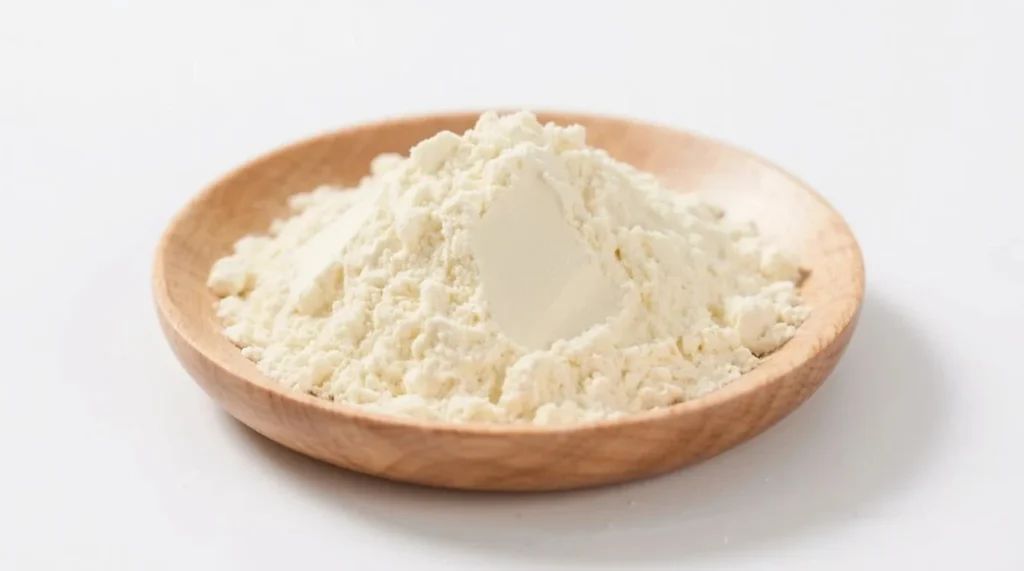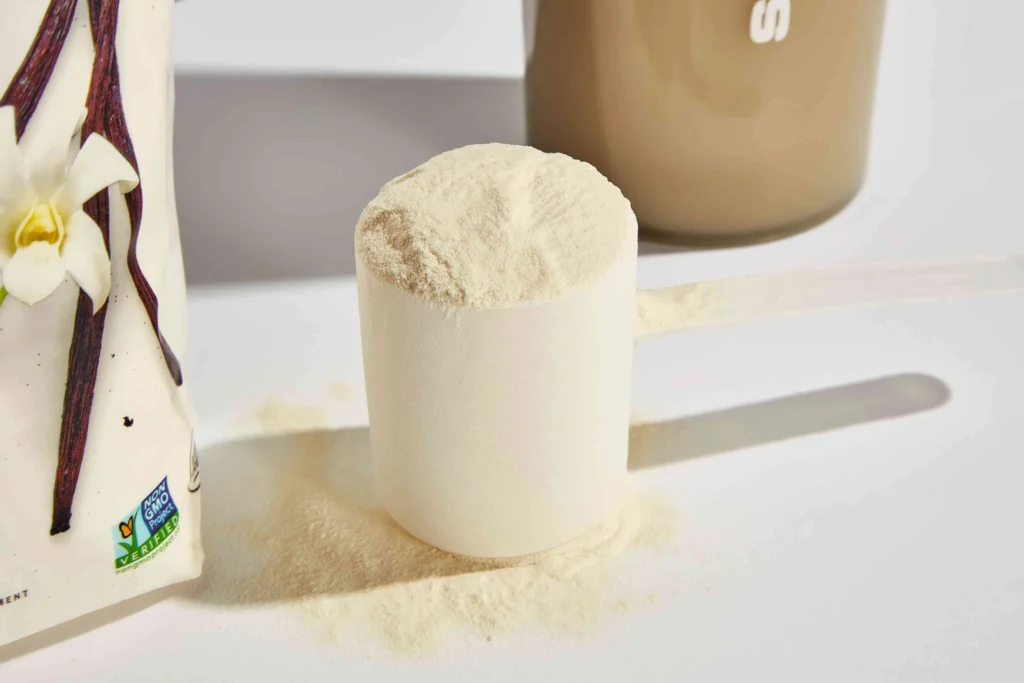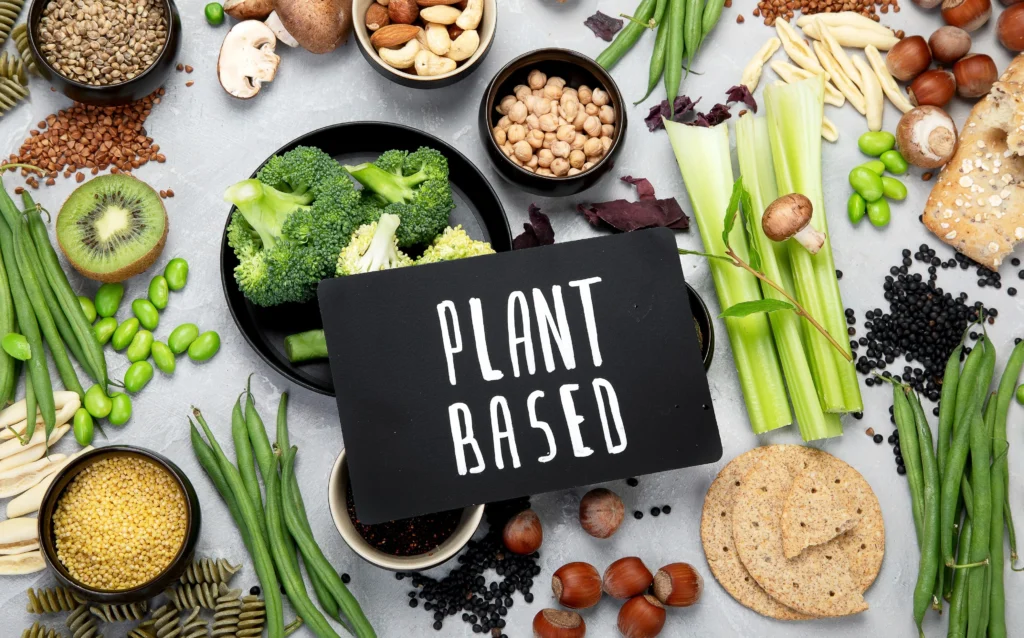プロテインパウダーの世界をナビゲートすることは、圧倒的に感じることがあります。健康食品の売り場を歩けば、壁一面に並べられたチューブや袋が目に飛び込んでくる。ホエイ、カゼイン、エンドウ豆、ヘンプ...数え上げればきりがない。ホエイ、カゼイン、エンドウ豆、ヘンプ...数え上げればきりがない: 大豆たんぱく.
ただの大豆プロテインではなく 有機大豆たんぱくパウダー.
植物由来のアスリート、体重を管理したい人、あるいは単に高品質でクリーンなタンパク質を食事に加えたい人なら、おそらく考えたことがあるだろう。しかし、誰もが躊躇してしまうような俗説や誤解を耳にしたこともあるのではないだろうか。
さて、記録を正す時が来た。私は栄養士として、数え切れないほどのクライアントをこの決断に導いてきた。このガイドブックは、そんな雑音を一刀両断するために作られた。有機大豆プロテインをあなたのウェルネス・ルーティンの強力な一部とするための具体的な方法をご紹介します。
有機大豆プロテイン・パウダーとは何か?
オーガニック大豆プロテインパウダーは、自然界で最も強力なタンパク源のひとつである大豆から作られた、シンプルでクリーンな製品です。しかし、地味な豆からシェイカーボトルの中の微粉末になるまでには、どのような過程を経ているのでしょうか?
有機大豆からプロテインパウダーへ:そのプロセスを解説
その旅はオーガニック認証大豆から始まる。これらの豆は、合成農薬、除草剤、遺伝子組み換え作物(GMO)を使用せずに栽培されている。収穫後、豆は殻を取り除かれ、フレーク状にされる。大豆油は取り除かれ、高タンパク質のフレークが残る。このフレークを洗って乾燥させ、微粉末にする。
大豆たんぱくアイソレートと濃縮物:その違いは?
市場には主に2つのタイプが出回っている:
- 濃縮大豆プロテイン: この形態は約70%のタンパク質で、大豆本来の食物繊維と炭水化物をより多く含んでいる。
- 大豆プロテイン・アイソレート: これはより精製されたバージョンで、さらに加工を加えることで炭水化物と脂肪のほとんどが取り除かれ、少なくとも90%のタンパク質を含むパウダーとなる。スクープあたりのタンパク質を最大にし、余分なものを最小限に抑えたい場合は、通常アイソレートを選択する。
オーガニック」が重要な理由:単なるラベルではない
オーガニック」を選ぶことは、大豆プロテインを購入する際に最も重要な決断のひとつです。私にとって、それが譲れない理由である:
- 遺伝子組み換えでない: USDAオーガニック認証は、製品に遺伝子組み換え作物が含まれていないことを法的に義務づけています。米国で栽培されている従来の大豆の大半が遺伝子組み換えであることを考えると、このシールはクリーンで自然な調達を保証するものです。
- 合成農薬不使用: 有機農法は有害な合成農薬や除草剤の使用を禁止しており、体にも環境にも優しい。それは、あなたが摂取しているものが純粋なものであることを知るという安心感のためなのです。
有機大豆プロテインの科学的裏付けのある7つの利点
では、この植物由来のパワーハウスは、実際にどんな効果があるのだろうか?その証拠は説得力がある。
- 筋肉増強のための完全なプロテイン・パワーハウス これはアスリートにとって大きな問題だ。多くの植物性タンパク質とは異なり、大豆は 完全タンパク質つまり、体内で生成できない9種類の必須アミノ酸がすべて含まれているのだ。特に、筋タンパク質の合成を誘発する重要なアミノ酸であるロイシンが豊富に含まれている。大豆プロテインは、レジスタンス・トレーニング・プログラムの一環として摂取した場合、筋肉の成長と筋力アップを促進するのにホエイ・プロテインと同じくらい効果的であることが、研究で一貫して示されている。
- 健康的な体重管理をサポート 満腹感と満足感を得るには、タンパク質が重要な役割を果たす。高タンパク質の食事は、食欲を抑え、1日のカロリー摂取量を減らすのに役立ちます。朝のスムージーにオーガニックの大豆プロテインを1スクープ加えると、日中の食欲を抑え、体重管理の目標を達成しやすくなります。
- 心臓の健康改善の可能性 FDAは以前から心臓に良いことを認識していた。 大豆タンパク質の利点.飽和脂肪とコレステロールの少ない食事の一環として、1日25グラムの大豆タンパク質を摂取すると、心臓病のリスクが低下する可能性がある。大豆タンパク質は、「善玉」のHDLコレステロールに影響を与えることなく、「悪玉」のLDLコレステロール値を下げるのに役立つことが示されている。
- 乳製品不使用の優れた代替品 乳糖不耐症や乳製品アレルギーを持つ何百万人もの人々にとって、乳清やカゼインプロテインは食卓にのぼらない。有機大豆プロテインは、乳製品に伴う消化不良を起こさない、素晴らしい高品質の代替品を提供する。
- 必須栄養素が豊富 タンパク質以外にも、大豆には貴重な微量栄養素がたくさん含まれています。鉄、リン、銅、マンガンが豊富に含まれており、これらはすべて、エネルギー生産、骨の健康、代謝機能全般に重要な役割を果たします。
- 可能性 更年期障害への効果 自然 大豆に含まれるイソフラボンは、更年期障害の症状管理に役立つ可能性が研究されてきました。個人差はあるものの、ほてりの頻度や程度を軽減する効果があることを示唆する研究もある。
- 消化吸収が良い 高品質の分離大豆たん白は、たんぱく質消化率補正アミノ酸スコア(PDCAAS)が1.0と、乳清たん白や卵たん白に匹敵する最高スコアです。これは、あなたの体が効率的にタンパク質を消化、吸収、利用できることを意味します。
神話を覆す:大豆プロテインは安全か?
部屋の中の象に対処しよう。インターネット上には大豆に関する相反する情報があふれている。
大きな疑問大豆プロテインはエストロゲンとテストステロンに影響するか?
これは間違いなく、特に私の男性顧客から最もよく聞かれる懸念である。この心配は、大豆に含まれる イソフラボン植物エストロゲンの一種である。これらは人間のエストロゲンと化学構造が似ているため、ホルモンレベルを乱すのではないかと心配される。
これが科学的な現実だ。植物性エストロゲンはヒトのエストロゲンではない。家の鍵に似ているけれど、鍵に合わない鍵のようなものだと思ってください。体内のエストロゲン受容体と相互作用するかもしれないが、その作用はもっと弱く、ブロックする効果さえある。
この疑問については、広範な臨床研究が検証してきた。2010年に発表された画期的なメタアナリシスは以下の通りである。 妊孕性と不妊15の異なるプラセボ対照試験のデータをプールしたものである。 大豆食品もイソフラボンのサプリメントも、男性のテストステロン濃度の測定値を変化させない。 圧倒的な科学的コンセンサスは明らかである:通常の推奨量の大豆タンパク質を摂取しても、女性化することはない。 男性への影響やテストステロンへの悪影響 レベルだ。
フィチン酸と "抗栄養素 "とは?
大豆は、他の多くの豆類、穀類、ナッツ類と同様、フィチン酸を含み、鉄や亜鉛などのミネラルの吸収をわずかに低下させる。しかし、分離大豆プロテインを製造するために使用される近代的な加工技術は、これらの「抗栄養素」の大部分を除去し、プロテインパウダーのためのこの問題はありません。
遺伝子組み換え作物とアレルギーに関する懸念への対応
遺伝子組み換え作物に対する懸念は妥当であり、それこそが、遺伝子組み換え作物を選択する理由なのである。 オーガニック認証 それは、非遺伝子組み換え製品を保証するものである。大豆は主要な食物アレルゲンのひとつなので、大豆アレルギーのある方は避けるべきです。それ以外の人にとっては、安全で健康的な選択肢である。
有機大豆プロテインと他の一般的プロテインとの比較
大豆は競合他社と比べてどうなのか?
大豆プロテインとホエイプロテインの比較:頭から頭までの比較
| 特徴 | 有機大豆プロテイン・アイソレート | ホエイプロテインアイソレート |
|---|---|---|
| ソース | 植物ベース(大豆) | 乳製品ベース(牛乳) |
| タンパク質の質 | 完了(PDCAAS 1.0) | 完了(PDCAAS 1.0) |
| 消化スピード | 中程度 | 速い |
| 最適 | ビーガン、乳糖不耐症、健康全般、筋肉増強 | 運動後の回復、筋肉増強 |
| アレルゲン情報 | 大豆を含む | 乳製品を含む |
大豆プロテインとエンドウ豆プロテイン:どちらの植物性プロテインが適しているか?
エンドウ豆プロテインもまた、植物由来の選択肢として人気がある。どちらも優れているが、若干の違いがある。大豆はそれだけで完全なタンパク質であるのに対し、エンドウ豆のタンパク質はアミノ酸のメチオニンがやや少ない。多くの ピー・プロテイン製品に玄米を加える プロテインでプロフィールを完成させる。味とテクスチャーに関しては、大豆プロテインはエンドウ豆プロテインよりも滑らかで「土っぽさ」が少ないと感じる人もいる。結局のところ、どちらのプロテインを選ぶかは、個人の嗜好と食事の許容度による。
有機大豆プロテイン・パウダーの選び方
すべてのパウダーが同じように作られているわけではありません。何を見るべきかは以下の通りだ:
- ラベルを読む: 最初の原材料は、"有機大豆プロテインアイソレート "でなければならない。クリーンで短い成分リストを探す。充填物、人工甘味料(スクラロースやアスパルテームなど)、人工香料のリストが長い製品は避けましょう。
- 第三者によるテストをチェックする: 評判の良いブランドは、しばしば製品を独立した研究所に送り、重金属やその他の汚染物質について検査させる。この認証は、品質保証にとって大きなプラスとなる。
- フレーバーとノンフレーバーの比較: 無香料は最も汎用性の高い選択肢だ。スムージーやオートミール、パンケーキ生地やスープなど、どんなものにも味を変えずに加えることができる。チョコレートやバニラなどのフレーバー付きは、水や植物性ミルクと一緒にシェイクするのに便利だ。
オーガニック大豆プロテインパウダーのクリエイティブな使い方
シェーカーボトルだけではありません!簡単で美味しい3つのレシピをご紹介します。
1.究極のグリーンプロテインスムージー
- オーガニック大豆プロテインパウダー(無香料またはバニラ)1スクープ
- ほうれん草 大1把
- 冷凍バナナ 1/2本
- 冷凍マンゴーまたはパイナップル 1/4カップ
- チアシードまたは亜麻の種 大さじ1杯
- 無糖アーモンドミルク 1.5カップ
指示する: すべての材料をなめらかにクリーム状になるまで混ぜる。
2.ふわふわプロテインパンケーキ
- オーガニック大豆プロテインパウダー(無香料またはバニラ)1スクープ
- ロールドオーツ1/2カップ(粉状にする
- ベーキングパウダー 小さじ1
- 卵1個(ビーガンの場合は亜麻卵でも可)
- 無糖の植物性ミルク1/2カップ
- シナモン 少々
指示する: 乾いた材料を混ぜる。濡れた材料を混ぜ合わせる。薄く油をひいたフライパンで中火にかける。
3.ノー・ベイク・エナジー・バイツ
- ロールオーツ麦 1カップ
- ピーナッツバターまたはその他のナッツバター 1/2カップ
- 蜂蜜またはメープルシロップ1/3カップ
- オーガニック大豆プロテインパウダー(無香料またはチョコレート)2スクープ
- ダーク・チョコレート・チップ 1/4カップ
- チアシード 大さじ1
指示する: すべての材料をボウルに入れ、粘りのある生地ができるまで混ぜる。1インチのボールに丸める。冷蔵庫で30分以上冷やし固める。
よくある質問(FAQ)
大豆プロテインは1日にどのくらい摂ればよいですか?
ほとんどの活動的な人にとって、バランスの取れた食事を補うには、1日1~2スクープ(約20~40グラムのタンパク質)が安全で効果的な量です。
大豆プロテインだけで筋肉はつくのか?
もちろんロイシンを豊富に含む完全タンパク質である大豆プロテインは、筋肉の修復と成長に必要なすべての構成要素を提供する。
大豆タンパク質は炎症を起こすのか?
実際、大豆に含まれるイソフラボンには抗炎症作用があることが複数の研究で示唆されている。ほとんどの人にとって、大豆に炎症はない。
大豆プロテインを避けるべき人は?
既知の大豆アレルギーを持つ人や、特定の甲状腺疾患を持つ人で、医師から大豆の摂取を制限するようアドバイスを受けている人は、大豆を避けるべきである。
結論有機大豆プロテインパウダーはあなたにとって良い選択ですか?
科学、利点、そして神話の背後にある事実を調べた結果、結論は明らかだ: 有機大豆プロテインパウダーは、幅広い人々に安全で効果的な優れた栄養補助食品です。
- アスリートのために、 筋肉増強に効果があることが証明されている。
- 健康志向の消費者向け、 心臓に優しく、クリーンで、万能な食材なのだ。
- 栄養学の初心者や乳製品に制限のある人向け、 これは利用しやすく、消化しやすい高品質のタンパク質源である。
オーガニック大豆プロテインを選ぶことは、単に筋肉に栄養を与えるということだけでなく、非遺伝子組み換えで無農薬の製品を意識的に選ぶことであり、健康を多角的にサポートすることなのだ。今こそ、自分の選択に自信を持ち、この植物由来のパワーを目標達成に役立てよう。




